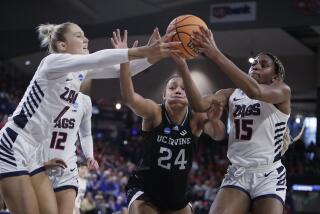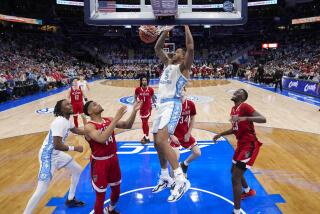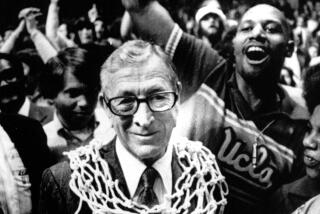Gonzaga Not Waiting for Midnight Hour
ATLANTA — Which school doesn’t belong?
A) Michigan State
B) Duke
C) North Carolina
D) Gonzaga
Take a seat, North Carolina.
Only three teams have reached the Sweet 16 each of the last three years, and Gonzaga--a tiny Jesuit university of 3,000 undergraduates in Spokane, Wash.--is one.
Even if anyone still believes Gonzaga rode Cinderella’s coach to the final eight in 1999, it would have reverted to a pumpkin by now.
Three years in a row make Gonzaga a program to be reckoned with.
“I mean, I haven’t brushed up on the fairy tale enough,” Coach Mark Few said. “I don’t know how many balls she went to. I thought she just went to one.”
It is three for Gonzaga--under two coaches and a changing cast of players already busy replenishing itself.
After the 1999 NCAA run that ended a step shy of the Final Four in a loss to eventual champion Connecticut, Dan Monson left to become coach at Minnesota.
Few, a Gonzaga assistant for 10 years, was promoted, and the Zags landed back in the Sweet 16 the next two years.
Matt Santangelo was the point guard who made the 1999 and 2000 teams go, breaking two of John Stockton’s school assist records and tying the other.
Dan Dickau, his replacement, is a dead-eye shooter who transferred from Washington and has averaged almost 25 points in his first two NCAA tournament games for Gonzaga.
“Matty was a wonderful guard who did a lot of great things for us, took a lot of big shots, brought us far in the tournament,” said Casey Calvary, the rugged forward you can expect to see as a solid role player in the NBA.
“I think Dan’s a better scorer.”
Michigan State Coach Tom Izzo, whose defending NCAA champions will face Gonzaga in a South Regional semifinal today, compared Dickau to a former Spartan, Scott Skiles.
Dickau’s idol can be found closer to home.
At Washington, he wore No. 12 in honor of Stockton, “the greatest point guard ever.”
After missing most of his sophomore year at Washington because of a heel injury, Dickau transferred to Gonzaga and chose No. 21, a backward nod to Stockton.
Though Stockton’s No. 12 never has been officially retired, no other Gonzaga player has worn it or is likely to.
“I made a tough decision to transfer,” Dickau said. “It was nothing against the coaches or players there.
“I saw what was going on at Gonzaga and I knew a lot of players over there like Casey and how much fun they were having while they were having success. And each one was improving.
“I guess you could say I was kind of jealous. I wanted a little bit of that.”
Replacing Calvary is the next big challenge for a program that has thrived even after Santangelo and Richie Frahm moved on.
If there is a secret to what Gonzaga has accomplished besides skillful, well-coached players who play their roles with diligence, it might be that every year, Gonzaga has seniors. That’s no longer automatic in college basketball.
“Continuity has been a big key to our success, to be able to keep our guys in our program for four years so they can kind of hand the mantle over to the next group,” Few said.
“We’re also playing with some very experienced people, as opposed to maybe playing with some talented 18-year-olds.”
Not to say he doesn’t have some.
Standing by to replace Dickau after next season is freshman starting off-guard Blake Stepp, a player second in the Oregon state all-star voting in 1999 only to Mike Dunleavy Jr., now at Duke.
Stepp was watching in 1999 when Gonzaga went to the final eight.
“Yeah, I was. It had something to do with it,” Stepp said.
Gonzaga signed him, even after Stanford, Oregon State, Washington, Washington State and Utah showed interest.
“If you look at our freshmen, Blake Stepp and Cory Violette, those are probably a direct reflection [of the NCAA success,]” Few said.
“I think there’s a tendency by parents and kids out there to say, ‘Well, I want to play in the Big Ten or the Pac-10 or the SEC.’ The ones who seem to work the best for us are the ones who say, ‘I need to judge Gonzaga based on Gonzaga and not what conference they’re in, then compare that to another program.’
“I think I like the way we stack up against most programs.”
The tournament runs have brought Gonzaga plans for a new on-campus arena, a lot more name recognition, a tournament reputation.
It had not bought them credibility with the NCAA selection committee.
“They’re not your typical 12 seed,” said Izzo. They’re one that has been there many times.
“Everybody knows, to get to the Sweet 16 three years in a row . . . if we’re looking past them, we deserve to get beat.”
More to Read
Go beyond the scoreboard
Get the latest on L.A.'s teams in the daily Sports Report newsletter.
You may occasionally receive promotional content from the Los Angeles Times.










